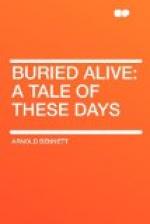The whispers ceased; the organist’s fingers began to move over five rows of notes, and over scores of stops, while his feet groped beneath, and Priam heard music, afar off. And close behind him he heard rumblings, steamy vibrations, and, as it were, sudden escapes of gas; and comprehended that these were the hoarse responses of the 32 and 64 foot pipes, laid horizontally along the roof of the screen, to the summoning fingers of the organist. It was all uncanny, weird, supernatural, demoniacal if you will—it was part of the secret and unsuspected mechanism of a vast emotional pageant and spectacle. It unnerved Priam, especially when the organist, a handsome youngish man with lustrous eyes, half turned and winked at one of his companions.
The thrilling voices of the choristers grew louder, and as they grew louder Priam Farll was conscious of unaccustomed phenomena in his throat, which shut and opened of itself convulsively. To divert his attention from his throat, he partially rose from the windsor chair, and peeped over the parapet of the screen into the choir, whose depths were candlelit and whose altitudes were capriciously bathed by the intermittent splendours of the sun. High, high up, in front of him, at the summit of a precipice of stone, a little window, out of the sunshine, burned sullenly in a gloom of complicated perspectives. And far below, stretched round the pulpit and disappearing among the forest of statuary in the transept, was a floor consisting of the heads of the privileged—famous, renowned, notorious, by heredity, talent, enterprise, or hazard; he had read many of their names in the Daily Telegraph. The voices of the choristers had become piercing in their beauty. Priam frankly stood up, and leaned over the parapet. Every gaze was turned to a point under him which he could not see. And then something swayed from beneath into the field of his vision. It was a tall cross borne by a beadle. In the wake of the cross there came to view gorgeous ecclesiastics in pairs, and then a robed man walking backwards and gesticulating in the manner of some important, excited official of the Salvation Army; and after this violet robe arrived the scarlet choristers, singing to the beat of his gesture. And then swung into view the coffin, covered with a heavy purple pall, and on the pall a single white cross; and the pall-bearers—great European names that had hurried out of the corners of Europe as at a peremptory mandate— with Duncan Farll to complete the tale!
Was it the coffin, or the richness of its pall, or the solitary whiteness of its cross of flowers, or the august authority of the bearers, that affected Priam Farll like a blow on the heart? Who knows? But the fact was that he could look no more; the scene was too much for him. Had he continued to look he would have burst uncontrollably into tears. It mattered not that the corpse of a common rascally valet lay under that pall; it mattered not that a




